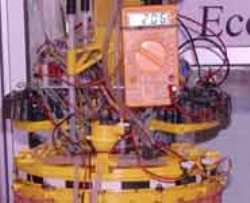Bristol Robotics Laboratory’s (BRL) Dr Jonathan Rossiter has achieved a research project grant to carry out his two-year research initiative titled ‘A robot that decomposes: towards biodegradable robotic organisms’.
 EcoBot-III (Image by Dr Ieropoulos, Bristol Robotics Laboratory)
EcoBot-III (Image by Dr Ieropoulos, Bristol Robotics Laboratory)
The major source materials for conventional robots are rigid resilient materials, which are non-biodegradable, mostly toxic and affect the natural ecosystem.
Once a robot has been deployed in the environment, it has to be constantly followed-up. After it has completed its mission, the robot can be recovered, disassembled and preserved. However, if the robot is irrecoverable, it may pose a threat to the eco-system, in addition to making the robotic projects so complicated. As each robot needs to be constantly tracked and recovered, there is reduction in the number of robots being used.
Dr Rossiter, and co-investigator Dr Ioannis Ieropoulos, who is BRL’s Senior Research Fellow and part of the University of the West of England (UWE Bristol) will demonstrate that the significant features of biological organisms such as decomposition after death can be observed with autonomous soft robotic artificial organisms.
According to Dr Rossiter, decomposition of biodegradable robot into harmless material takes place after it has completed its mission activity such as environmental cleaning of an oil spill.
The need for recovering and tracking each robot will therefore be eliminated, giving rise to inherently safe implementation of extensive biodegradable robots within the environment. Several hundreds of robots can be potentially deployed, ensuring zero environmental impact.
Being developed at the BRL, Ecobot robot will have improved capabilities as a result of biodegradability. This autonomous robot will derive its energy by consuming biomass from the environment.